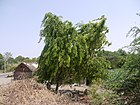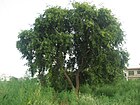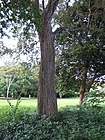Note: This is a project under development. The articles on this wiki are just being initiated and broadly incomplete. You can Help creating new pages.
Difference between revisions of "Dalbergia sisso"
| (2 intermediate revisions by the same user not shown) | |||
| Line 68: | Line 68: | ||
<ref name="chemical composition">[Chemistry]</ref> | <ref name="chemical composition">[Chemistry]</ref> | ||
<ref name="Leaf">[Morphology]</ref> | <ref name="Leaf">[Morphology]</ref> | ||
| − | <ref name="How to plant/cultivate">[Cultivation]</ref> | + | <ref name="How to plant/cultivate">[http://tropical.theferns.info/viewtropical.php?id=Dalbergia+sissoo Cultivation]</ref> |
| + | </references> | ||
| − | + | ==External links== | |
| + | |||
| + | * [https://uses.plantnet-project.org/en/Dalbergia_sissoo_(PROTA) Dalbergia sisso on plantnet-project.org] | ||
| + | * [https://hort.purdue.edu/newcrop/duke_energy/Dalbergia_sissoo.html Dalbergia sisso on purdue.edu] | ||
| − | |||
| − | |||
| − | |||
| − | |||
[[Category:Herbs]] | [[Category:Herbs]] | ||
Latest revision as of 13:29, 23 April 2020
Dalbergia sisso is a deciduous medium-sized tree growing up to 30 metres tall. The bole is often crooked and branchless for up to 8 metres, occasionally for as much as 20 metres
Contents
- 1 Uses
- 2 Parts Used
- 3 Chemical Composition
- 4 Common names
- 5 Properties
- 6 Habit
- 7 Identification
- 8 List of Ayurvedic medicine in which the herb is used
- 9 Where to get the saplings
- 10 Mode of Propagation
- 11 How to plant/cultivate
- 12 Commonly seen growing in areas
- 13 Photo Gallery
- 14 References
- 15 External links
Uses
Skin diseases, Gonorrhoea, Wounds, Gastric mucosa.
Parts Used
Chemical Composition
Common names
| Language | Common name |
|---|---|
| Kannada | |
| Hindi | |
| Malayalam | |
| Tamil | |
| Telugu | |
| Marathi | |
| Gujarathi | |
| Punjabi | |
| Kashmiri | |
| Sanskrit | |
| English |
Properties
Reference: Dravya - Substance, Rasa - Taste, Guna - Qualities, Veerya - Potency, Vipaka - Post-digesion effect, Karma - Pharmacological activity, Prabhava - Therepeutics.
Dravya
Rasa
Guna
Veerya
Vipaka
Karma
Prabhava
Habit
Identification
Leaf
| Kind | Shape | Feature |
|---|---|---|
Flower
| Type | Size | Color and composition | Stamen | More information |
|---|---|---|---|---|
| {{{5}}} |
Fruit
| Type | Size | Mass | Appearance | Seeds | More information |
|---|---|---|---|---|---|
Other features
List of Ayurvedic medicine in which the herb is used
Where to get the saplings
Mode of Propagation
How to plant/cultivate
A plant of the tropics and subtropics, it is adapted to a seasonal monsoon climate and a dry season of up to 6 months.[3]
Commonly seen growing in areas
Open deciduous forest, Alluvial soils, Along rivers.
Photo Gallery
References
- ↑ [Chemistry]
- ↑ [Morphology]
- ↑ Cultivation
External links
Categories:
- Ayurvedic Herbs known to be helpful to treat Skin diseases
- Ayurvedic Herbs known to be helpful to treat Gonorrhoea
- Ayurvedic Herbs known to be helpful to treat Wounds
- Ayurvedic Herbs known to be helpful to treat Gastric mucosa
- Herbs with Wood used in medicine
- Herbs with Roots used in medicine
- Herbs with Leaves used in medicine
- Habit - Deciduous tree
- Index of Plants which can be propagated by Seeds
- Herbs that are commonly seen in the region of Open deciduous forest
- Herbs that are commonly seen in the region of Alluvial soils
- Herbs that are commonly seen in the region of Along rivers
- Herbs




